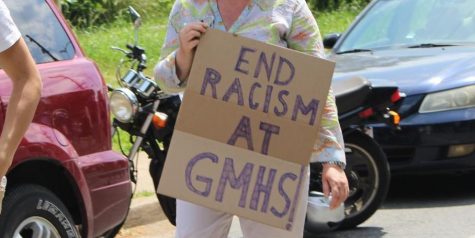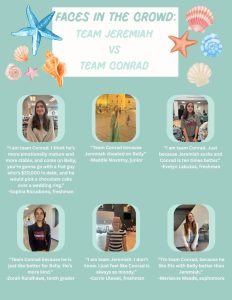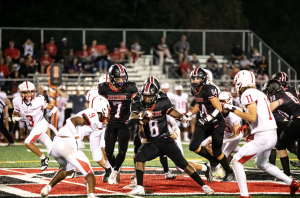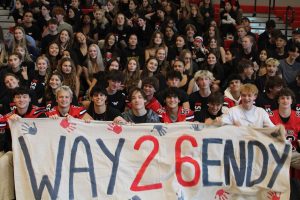Let’s talk about race. In class.
June 23, 2020

Umika Pathak is a rising senior at GMHS. She serves on the senior class SCA.
A favorite joke of the Mason student body is the issue of diversity in Falls Church. We are a wealthy and predominantly white community which perhaps offers up some hardy comedic material. I too laugh at these jokes, and they indicate a certain level of self awareness among us, but the need for a more meaningful conversation about race and privilege is long overdue in FCCPS. We don’t talk about race enough in the one place where we really should: our classrooms.
Race should be part of our core conversation because of its significance in today’s society. Schools play a pivotal role in the cultivation of a student’s mind and how we learn to be in the world. As a result, learning about the complexities of race in school is essential to being informed and cognizant of the world, including and beyond Falls Church.
We need to consider what sorts of resources we should bring into our community to best empower and equip teachers and students alike to facilitate and participate in the learning process.
This process will appear differently all throughout our schools. It should appear as training on implicit bias. It should be a curriculum expansion in our History departments to be more comprehensive and less eurocentric. It should be reevaluating our English reading lists so that the literature we learn about affirms a more diverse range of cultural experiences, as well as widening the scope of classroom discussions about works that we already learn about.
I see many opportunities within our classrooms and professional development spaces to incorporate discourse about race that would help us avoid misunderstandings including those that I have experienced at FCCPS.
Knowledge is empowering. I have personally felt empowered over this past school year because my understanding of the role of race in America became much more nuanced through the IB History class that I took where I learned about highly relevant pieces of the history of race in our country in great detail including slavery, the Civil War, Reconstruction, Jim Crow, and the Civil Rights Movement. I am able to evaluate my own privilege and responsibility better because of my understanding of the past. I have been able to connect my learning to recent events and really see them for what they are. This is why it’s important that we all have the chance to learn about this history in detail, not only those of us who choose to take this course.
We also need to learn about Falls Church history more extensively in school. It’s powerful that our middle school is named after Mary Ellen Henderon, but a symbol is only as powerful as the understanding behind it. In order for her to be a role model we need to learn about what she fought for, and to take pride in Falls Church at present and in the future, we need to be conscious of its past.
When it comes to the ongoing conversation about changing the names of George Mason and Thomas Jefferson, the reverse is also true: the understanding of history that we teach should be evident in the symbols we choose to represent us. Thomas Jefferson’s and George Mason’s enslavement of individuals is more than a mistake or a flaw, and shouldn’t be treated as such as we discuss this change.
Additionally, it’s important to affirm a diverse range of cultural experiences in our community by reflecting those experiences in the faculty of FCCPS. The need for diversity in a school system to reflect the diversity of America and the world does not begin and end with the students.
FCCPS is an IB oriented school system which means that we value global citizenship and awareness. Supporting a culture rooted in these values means that we have to start early, from our youngest all the way up to those of us who are soon-to-be college bound.
Current events are demonstrating a long held need for change, and I believe education is how we bring about that change. Here in Falls Church we are privileged and that means it is up to us to hold ourselves accountable in every capacity that we can. FCCPS is already a well intentioned space that is brimming with optimism which is why I know how capable we are of becoming even more well educated and even better citizens of the world. It’s not always comfortable or easy, but it is my hope that regardless, the courage and drive of FCCPS will not fade.








June Beyer • Jul 7, 2020 at 7:48 AM
Thank you for an important and well written article, Umika. I agree with your message of education and appreciate your caring heart.
Our schools and staff work extremely hard to respond to racism. We are grateful for the many socially conscious citizens too.
May I expand by being blunt? We need help! Racism is a daily occurrence in our city and school system. I’m thankful that people are marching in support of BLM but it truly isn’t enough!
Our Beyer family never would have imagined the extent of racism in our beloved FCC community until our mixed race grandchildren taught us otherwise.
The N word, threats on the school bus, constant bullying on the playground and exclusion. That’s the worst. Oh and attending schools named after slave holders!
One amazing FCC council member is a survivor of a frightening racist attack in the street by two parents after a PTA meeting/party! Outrageous!
Two years ago when our MEH principal sent out a letter calling for community assistance expressing concern for students of color and religion, the Little City response amounted to nothing.
We can and must do more! Early intervention is key so we need funds to begin education with preschool children not just older students. FCEF Director Debbie Hiscott has been leading this effort for which I am thankful!
Let’s start with one kind and gentle word at a time. One invitation, two open hearts, three steps to Unity and Love.
We refuse to tolerate racism, violence and cruelty! The best gift we can give to our children is empathy. Thank you for continuing discussions leading to action with hope, Umika! You are The Wonderful Future!💖
Liz hume • Jul 4, 2020 at 5:28 PM
Powerful article!
Alison Kutchma • Jul 4, 2020 at 1:40 AM
Thank you for writing this important piece. I believe the most substantive thing that we could do in our community is to look at how resources are spent within our own school system for our own students. You state so well that “we need to consider what sorts of resources we should bring into our community to best empower and equip teachers and students alike to facilitate and participate in the learning process.” The first step of that process is to go to our state website and look at the SOL pass rates by subgroup. That will inform the discussion as to where resources are direly needed. We spend a lot of money here and yet we still have those scores that one will fine. Despite that, we have been able to afford small classes in our high school for decades, 6, 8, 10, 15 students in each section for our 11 and 12th grade IB students, while needed training to equip our teachers goes unfunded. We need to look at this issue substantively because the reality is we will have to choose and in my experience there is so much discomfort in just bringing up the topic. Bravo for contributing to what I hope will be a long and detailed sunstantive conversation.
Ben Lewis • Jun 25, 2020 at 7:27 AM
Great article, Umika! Very well put. We are at the beginning of a movement that must do nothing less than decide what kind of democracy can be ok with a caste system, for that is what we now have. The country was stolen from native people through genocide, and built on the backs of black slaves who were Then systematically and legally (as with native Americans) disenfranchised.